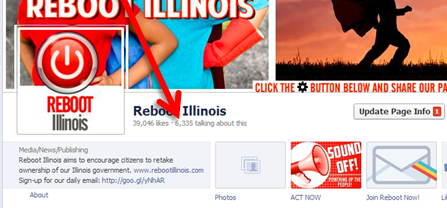For the past few months the Reboot Illinois team has been watching the 2014 candidates for Illinois governor carefully, but I have been paying particularly close attention to the candidates’ social media profiles. Why? Because social media is not like any other news source. Unlike your favorite newspaper, Facebook and Twitter were created to encourage people to be social, i.e. two-way communication. So, what do I see when I look at the candidates’ social media pages? Here’s my breakdown of Facebook:
When most people see a Facebook page that has a high number of “Likes”, the first thought is: “Wow! This page/person/topic must be really popular!”
Surprise! This is not always true.
Since Facebook allows Pages (not personal pages like yours) to advertise, it is easy to buy “Fans” or “Likes” if you throw enough money into Facebook Ads. So, how do you tell the difference between a Facebook page that is actually popular and one that’s pretending to be? Talking About This, also known as "People Talking About This" or PTAT.
What is “Talking About This”?
The little number next to the Page’s number of Likes is a great indicator for whether or not a page is actually popular.
In short, it is a ticker that tracks the number of people who have interacted in some way with a particular page over the past seven days. Note: The ratio for number of fans: “Talking About This” varies from page to page, the best way to evaluate is to compare to another similar page, i.e. Apple to Microsoft.
Why is “Talking About This” important?
Like in real life, just because you have money, doesn’t make you popular. Anyone can buy Facebook fans, but that doesn’t mean they’re engaging their fans (i.e. getting people to talk about their page) by either putting up interesting Facebook posts, or by replying to their fans’ comments on their posts. So, if you see a page with a TON of Facebook fans, check to see how many people are actually engaging with that page, and compare it to other similar pages. Who is actually popular?
Now that you know how to spot a real, popular Facebook page, let’s see which candidate actually is engaging with those who "like" them:
-Madison Bondi, Reboot Illinois
More content from Reboot Illinois:
